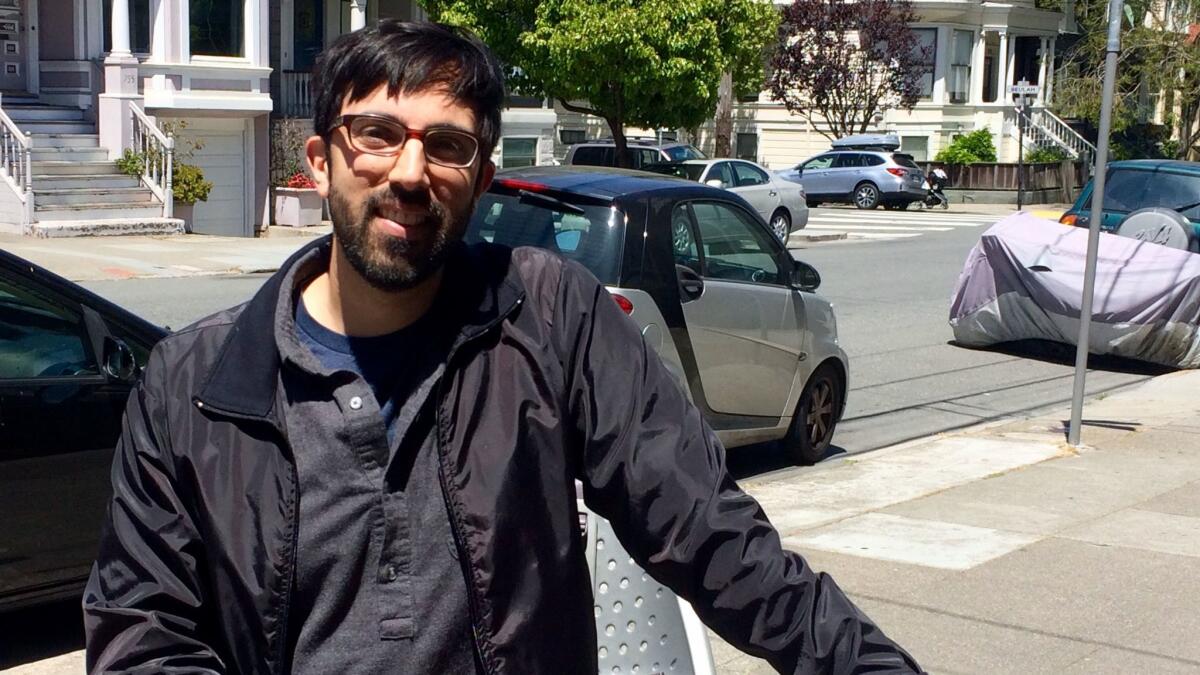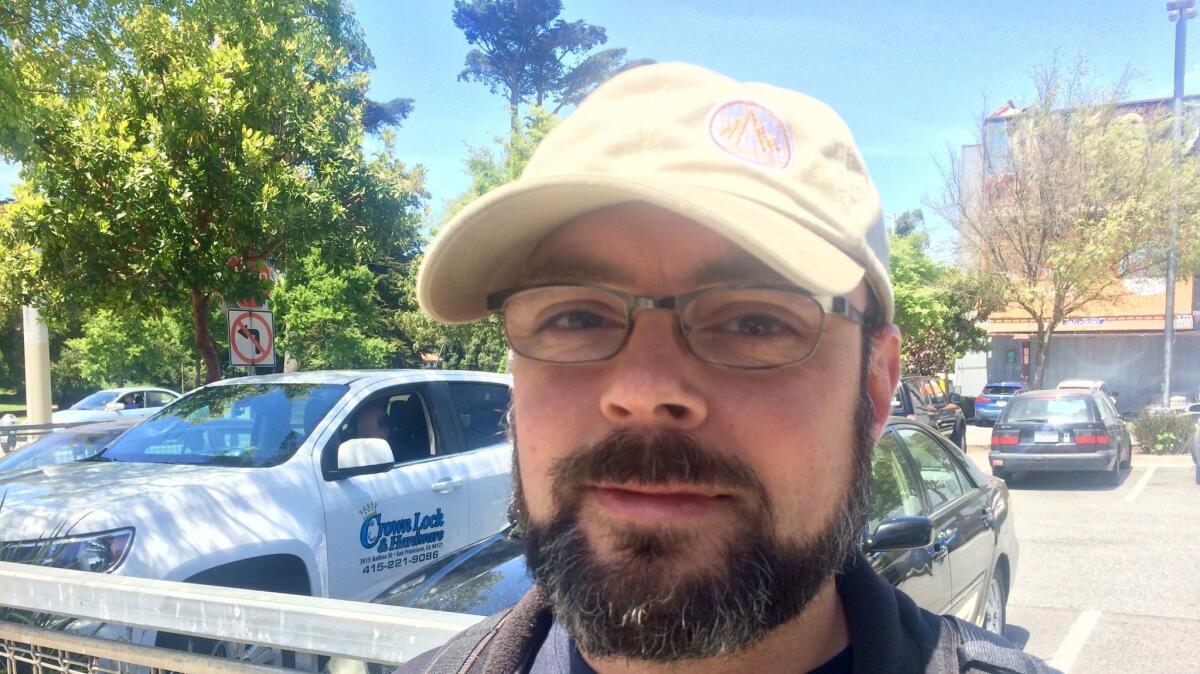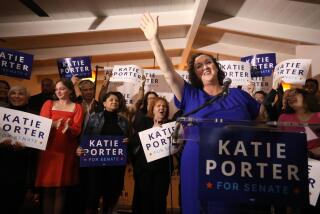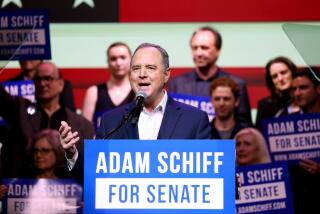On Politics: All is not peachy as Georgia congressional race takes a detour through San Francisco
The commercial plays as a blend of perky exuberance and conservative fever dream.
The characters are a fantasia of Left Coast lunacy: the earnest millennial, the retro-hippie, the girl in chunky glasses, the dude in dreadlocks. Together they happily praise higher taxes, a weak military and the virtues of one Jon Ossoff.
It may be confusing, especially for its audience in the Atlanta suburbs. With the sound off and flashes of Fisherman’s Wharf, the Golden Gate Bridge and a cable car, it could be a tourist promotion for one of America’s most enchanting cities.
But that’s not at all the point.
The purpose of the TV spot is to tie Ossoff, the Democratic candidate in a tight Georgia congressional race, to the supposed depravity and twisted liberalism of San Francisco and its elected representative, Nancy Pelosi. The strategy is older than some of the actors involved.
For more than a generation, Republicans have used this overwhelmingly Democratic city as political code for woolly thinking and moral turpitude. In 1984, a few weeks after Democrats gathered here to nominate their candidate for president, U.N. Ambassador Jeane Kirkpatrick appeared at the Republican convention in Dallas and assailed “San Francisco Democrats” and their “blame-America first” foreign policy.
From there, in the spirit of fear and loathing, the shorthand broadened to a more generalized attack on big cities, urban dwellers, gay rights, permissiveness and an alleged attack on what were then known as traditional family values.
The assault gained heightened currency and a public face in 2003 when Pelosi was elected as the Democrats’ House leader and, four years later, the first woman speaker in history, making her a fixture in Republican attack ads nationwide.
So, like a person standing before a funhouse mirror, San Franciscans easily recognized the image presented to voters in Georgia’s 6th Congressional District. (The advertisement was paid for and produced by a political action committee supporting Karen Handel, the Republican facing Ossoff in Georgia’s June 20 runoff.)
“It’s clear what they’re trying to do,” said Maz Ameli, a 35-year-old software engineer, after watching the ad on YouTube. “It’s the whole fruits and nuts thing.”

“They’re playing to a stereotype,” agreed Barbara Deuel, 58, who designs and sells inspirational jewelry for a living. “The idea that anything goes, we’re all heathens and drug addicts.”
Those were among the printable responses gathered in two dozen sidewalk interviews around the Haight-Ashbury and Castro District, two of San Francisco’s iconic neighborhoods.
It’s not as though residents didn’t have plenty of complaints about this lovely, complicated place: about taxes, bureaucracy, through-the-roof housing costs and, especially, the flood of rich, entitled young techies turning the city into a playground for the privileged.
Even some who consider themselves proudly progressive say San Francisco’s prevailing left-wing philosophy can go to extremes. This is, after all, a place where Pelosi has been picketed as a right-wing warmonger (for refusing to cut funding for troops fighting in Iraq) and recently drew a Democratic challenger assailing her as insufficiently liberal.
But it’s something else to hear that criticism from outsiders.
Richard Lee, 53, is a native who has spent decades working for the city’s public transit system. Since 2001 he’s been a streetcar operator on Muni’s F line — “ ‘F’ is for fun” — which runs between the Castro, San Francisco’s gay mecca, and Fisherman’s Wharf.
They’re playing to a stereotype. The idea that anything goes, we’re all heathens and drug addicts.
— San Franciscan Barbara Deuel
During a cigarette break, he griped about the city’s chronic homeless problem and its hyperactive protest scene. On a recent weekday, he said, the main thoroughfare, Market Street, was shut down by separate demonstrations over President Trump, the Dakota Access oil pipeline and China’s policy toward Tibet.
“Things have gotten way too far to the left,” he said.
Still, he didn’t appreciate the parody presented in the anti-Ossoff ad.
“I don’t like people mocking us,” Lee said, a swagger in his voice as he leaned against his red-and-orange vintage rail car. “It can be annoying, but this is still a great town.”
(For the record, though the spot ends with an exuberant dreadlocked fellow exclaiming, “San Francisco loves them some Jon Ossoff!” only three of the 24 people interviewed could identify the Democrat without prompting.)
For many who live here, the caricature fails to capture not just the beauty and vibrancy of their city but also the forward thinking and tolerance which, since Gold Rush days, has made San Francisco a magnet for the venturesome, the entrepreneurial and free-spirited. That, they say, is a large part of the attraction.
“For me, San Francisco has always been a test bed for being open with yourself and culture and society and being accepting of that openness,” said Lee Farless, 44, a biologist, as he paused in the Haight, the old hippie haunt on the fringe of Golden Gate Park. “And from there, people can go down different paths,” conventional or otherwise.

Sometimes truth is stranger than the portrayal on screen.
In the 2006 midterm election, when Republicans were desperately fighting to hang on to control of the House, they warned of the perils of Pelosi and a Democratic majority.
“Do we really want Nancy Pelosi’s San Francisco values leading the culture war?” Dennis Hastert, then the GOP House speaker, sneered in a column for the National Review Online.
Hastert is now federal prison inmate No. 47991-424, serving a 15-month sentence involving hush money he paid to cover up his sexual abuse of teenage boys.
Talk about twisted.
@markzbarabak on Twitter
ALSO
Here’s why Dianne Feinstein could well become the longest-serving U.S. senator in California history
Pete Wilson looks back on Proposition 187 and says, heck yeah, he’d support it all over again
The Republicans who made Reagan president mourn the party they once knew
More to Read
Get the L.A. Times Politics newsletter
Deeply reported insights into legislation, politics and policy from Sacramento, Washington and beyond. In your inbox three times per week.
You may occasionally receive promotional content from the Los Angeles Times.







